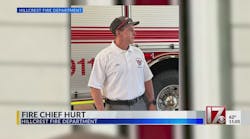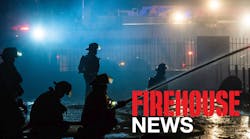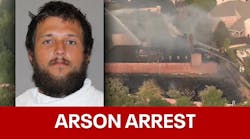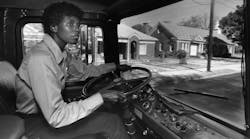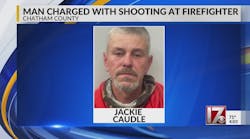McDaniels is a graduate of the National Fire Academy's Executive Fire Officer program and the executive development program at Loyola University, and he holds an associate's degree in fire protection technology. In 1992, he was awarded a fellowship to the John F. Kennedy School of Government at Harvard University.
The chief is certified as a fire instructor, fire inspector and fire investigator by Louisiana State University Fire Training. He serves as chairman of the Orleans Parish Communications District (911 Operating System) and is immediate past president of the Metropolitan Chiefs Committee, a division of both the National Fire Protection Association (NFPA) and International Association of Fire Chiefs (IAFC). McDaniels is a member of the Board of Visitors of the National Fire Academy, the board of directors of the NFPA and the Governor of Louisiana's Arson Strike Force.
He was interviewed by Editor-in Chief Harvey Eisner.
Firehouse: Is there any new direction in which the fire department is going?
McDaniels: The First Responder Program is number one on the agenda. We started four years ago with eight units. We are now working to complete the department's training, then dispatch the trained units. We will have a major impact on medical response times. We have brought the response time down to eight minutes. The health department handles ALS and transports. We expect to drop the response times further when we have 33 engines responding. Truck companies will be dispatched on some situations. Eventually, we will have every unit trained, equipped and dispatched. The department has doubled and almost by two thirds increased responses. The third service continues to handle the ALS and transport. We may be able to handle the operations of the third service in the future.
Firehouse: What is the status of apparatus replacement?
McDaniels: Funds from capital and operating budgets were used to replace half the fleet that averaged over 20 years old. Today, half the fleet is less than 10 years old. We are going to purchase a few more vehicles and are looking at leasing to bring the fleet up to date. Our ISO rating went from a 3 to a 2. In upgrading the fleet, following the Louisiana Property Insurance Association, we have taken a better look at record keeping in fire prevention, public education, dispatching and training. It is an old city that the department can impact in these areas. We have plans to work toward a Class 1 rating. We are working with the utilities and water delivery. EMS is giving the department challenges to utilize manpower and on-duty strength.
Firehouse: How has the use of computers and computer-aided dispatch (CAD) helped the department?
McDaniels: We have had the computer-aided dispatch for several years. We are better able to track units and we are connected to the health department by radio. This crosstalk radio system allows the medical authorities to provide medical advice and what should be done at an EMS scene. Our records management allows the fire department to internally categorize reports so we can make good decisions.
Firehouse: Do you worry about the weather and storms?
McDaniels: The city is located seven feet below sea level. Any water that comes in has to be pumped out. Storms often overwhelm the pumping capacity. Wires will come down during storms. Response due to high water is difficult in many areas. We are careful not to stall the trucks. We may have to make a decision to respond during high wind conditions. There are several firehouses located in low-lying areas. After the civilians are evacuated, the firefighters are relocated to higher ground. You can drive by certain areas and the ships are over your heads.
Firehouse: Does the waterfront offer special problems?
McDaniels: Special operations, the waterfront, building collapse, hazardous materials and heavy rescue activities are all coordinated by the special operations chief. For weapons of mass destruction, auto extrication and train derailments, we keep our people on the cutting edge to respond effectively. Along the Mississippi River there are chemical plants and refineries. We have a lot of rail and highway traffic. Our units respond to quite a bit of hazardous materials incidents. We also have containers that can hold hazardous materials. We keep our engine and rescue personnel trained to the responder and technician level. All chiefs have hazardous materials incident command training.
Firehouse:When the department responded to the incident at Riverwalk in which the ship, the Brightfield, rammed the structure, did you send the first responders in?
McDaniels: Thirty rooms were wiped out in the hotel. We were lucky there were only a few injuries. The first responder program was to begin the next day. We dispatched units because of the potential for injury, but there weren't that many.
Firehouse: You are hosting the International Association of Fire Chiefs (IAFC) annual convention in August. What does that mean to the city?
McDaniels: Not only the New Orleans Fire Department, but the Louisiana fire departments and chiefs are looking forward to the show. We have one of the largest convention centers and all the sights are within walking distance.
Firehouse: When the department prepares for Mardi Gras, do you have to make extra preparations?
McDaniels: We put extra units into service. The parades split the city in half. We place units on either side. We add first responder "sprint" units that are easier to get around in than apparatus. We divide up the French Quarter and add manpower.
Firehouse: With the large number of people crowded onto balconies during Mardi Gras, have there been any problems?
McDaniels: We have had a few incidents where they have collapsed. Inspectors have stepped up their efforts to determine the weight loads and talked to building owners.
The Mardi Gras goes for 10 days. Millions of people come to the city. Hundreds of millions of dollars go to the local economy. There are very few problems with crowd control. The police do an excellent job. It is mostly a family holiday. Most people only see the coverage from the French Quarter.
Firehouse: Is there a plan to build or renovate the fire stations?
McDaniels: In our capital program we are going to a three-bay concept, task force operation. In the past, we have lost some units. There are several new stations on the drawing board. We are also working on repairing and renovating existing stations.
Firehouse: Are you going to replace fire headquarters?
McDaniels: We have outgrown the headquarters, which was built in 1913. The museum is going well and we are adding artifacts and providing public education.
Firehouse: Is there a problem with vacant buildings in New Orleans?
McDaniels: There is a large number of vacant buildings. They are used by vagrants, mostly in the winter to keep warm. The danger is the exposures which are three to six feet apart. The city is working to tear down these buildings.
Firehouse: Many fire departments across the country are experiencing a large turnover due to pension buyouts and other incentives. Do you have this problem?
McDaniels: We had a large turnover a few years ago. It has stabilized. We are making promotions and filling vacancies as best as we can. At one time, we couldn't fill the vacancies and we had to hold back on those positions.
Firehouse: Are you providing additional training?
McDaniels: We are looking at adding PowerPoint programs and courses for officers from the National Fire Academy. In-service training continues at the local level or at the training school.
Firehouse: Have your recruitment programs been successful in adding women to the ranks?
McDaniels: Candidates who can pass the rigors of training are needed. We have one female who will become a probationary member. There are two more who are entering recruit school. We are concentrating our efforts so that the program will expand.
Firehouse: Is it true that the public really likes and appreciates the service that the fire department provides?
McDaniels: In a recent city government study, 89% of the public said it has extreme confidence in the fire department. I tell the department we need to keep confidence and provide the service the citizens need.
Firehouse: You are a member of a number of national fire service associations and boards. How has that helped you and the department?
McDaniels: Being on the Board of Visitors of the National Fire Academy has kept me on the forefront of training. With the NFPA (National Fire Protection Association), I've kept up on codes and standards. I am the immediate past president of the Metro Chiefs section of the IAFC.
There is a great deal of esteem that the department has received on the national level. I am able to keep up with the trends within the fire service and with people from across the country and around the world.
Firehouse: Are there any other future plans for the department?
McDaniels: I would like to bring the department strength from 700 to 800. We have four person staffing now and have an adequate first alarm response. We are well qualified in the future to take over EMS. But there are no plans presently.


